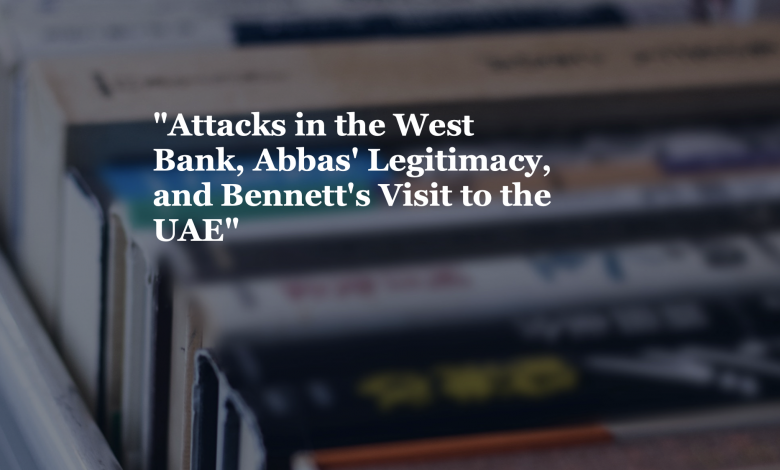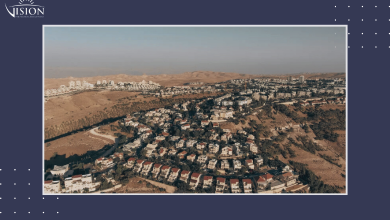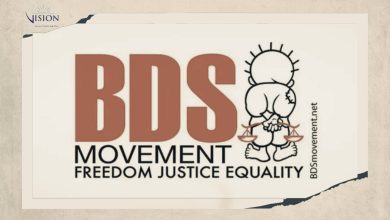The MonthlySkimm: December 2021

“Attacks in the West Bank, Abbas’ Legitimacy, and Bennett’s Visit to the UAE“
Mohammed Hasan Darkhalil
The Motives Beyond Palestinian Attacks against Israeli Targets in the West Bank
In Yossi Kuperwasser’s analysis “Latest Palestinian Attacks are Motivated by Incitement Combined with Hamas’ Interest to Increase Terror” published by the Jerusalem Center for Public Affairs, he argues that among the factors behind recent Palestinian attacks in the West Bank are the ongoing incitement among Palestinians against the Zionist project with the belief that Israel will eventually dissolve. The ongoing incitement is also always accompanied by Hamas and Islamic Jehad attempts to organize cells designed to carry out violent attacks a gainst Israeli targets. Furthermore, he believes that another contributing factor is the generous salaries received by their families. Finally, Kuperwasser argues that Palestinians who suffer from mental stress are more likely to carry out such violent attacks, although he finds that this is not the only underlying factor.
Mahmood Abbas’ Lost Legitimacy
Yohanan Tzoreff emphasizes the crucial significance of restoring the status of Palestinian President Mahmood Abbas (Tzoreff, 2021). In “Israel and the Palestinians: Approaching an Age that Defies Negotiations,” he shows how Israeli attempts to erase the Palestinian cause from the international and regional agenda is unrealistic. This idea motivated the Israeli government’s move to further internal and foreign policies without Palestinian authorities, leading to potential undesired trajectories such as the collapse of Palestinian authorities. When the peace process takes place and the PA is finally able to maintain sufficient financial resources for running it’s machine of rule efficiently, the status of Abu Mazen can onc again be restored. Abu Mazen’s weak position is in favor of Hamas, which imposed its will upon the Israeli government following the last violent exchange. The writer highly recommends that the Israeli not present an obstacle in the face of PA-US relations. The key to restoring Mahmood Abbas’ weak legitimacy is Israel, the United States, and the international community.
The Feasibility of the One-State-Solution
In “Resolving the Israeli-Palestinian Conflict: The Viability of One-State Models,” Pnina Baruch attempts to examine the feasibility of a one-state-solution by discussing all possible models of the above mentioned trajectory as a replacement to the two-state-solution. The unitary state, which is an autonomous Palestinian state, a federal state, and a confederation were discussed in detail as per the possible contextual implications. Baruch concluded that none of the models would provide a permanently successful solution to the conflict for several reasons; the most important of which is the vulnerability to internal violence resulting from previous long-term hostility between the two populations (Baruch, 2021).
The End of the Arab-Israeli Conflict?
Dan Schueftan in “The Beginning of the End of the Arab-Israeli Conflict?” emphasizes that pan-Arab states, which once constituted a real threat, are no longer part of the equation when it comes to posing a threat to Israel. In his strategic assessment, Schueftan estimates that both Israel and Arab states would cooperate and increase efforts in confronting the long-term threats posed by Turkey and Iran (Schueftan, 2021).
Bennett’s visit to the UAE
Bennett’s visit to the UAE took place in a context of no less than sixty memorandums of understanding across a variety of areas including development, trade, research, education, health, cybersecurity, and so on. In “Bennett Visit Shows the UAE Balancing Between Israel Ties and Regional De-escalation,” David Makovsky emphasizes that this meeting was meant to consolidate bilateral security and economic ties. However, potential cooperation would face complications were the Iranian nuclear program to come to a head (Makovsky, 2021).
Aaron Miller has summarized three takeaways from Bennett’s visit to the UAE (Miller, 2021). First, he draws attention to the flowering relationship between Israel and the UAE, through which unique quality and quantity impacts took place. This happened at a pace which outdid that of the previous normalization between Egypt and Israel. Second, Miller points out a shift in the priorities of regional Arab states resulting from frustrations against Iran and regional armed groups such as Hamas. This shift comes in light of American withdrawal from the region and the gradual decrease of Iranian threats, as if these Arab states perceive Israel as a replacement to the USA with regards to it’s role in maintaining regional security. Finally, Miller characterizes the visit as a message that Bennett is eager to avoid peace talks with the Palestinians.
Division in the Jewish Political Community in the US
In “the Divided Jewish Political Community in America, published in the American Enterprise Institute, Samuel Abrams demonstrates the segmentation of American Jews with regards to the traditional Jewish communal identity in the US where a considerable rate of newer Jewish generations identify as liberals and ideologically contradict with their traditional Orthodox counterpart (Abrams, 2021). Only 20 percent of liberal Jews feel that they are a part of the Jewish community in the US. This low rate also applies to conservative Jews, where only 35% feel a sense of belonging to the community. He concludes that there is no longer one united traditional Jewish voice which staunchly supports Israel.
References:
Makovsky, D. (2021). Bennett Visit Shows the UAE Balancing Between Israeli Ties and Regional De-escalation. Retrieved from The Washington Institute: Bennett Visit Shows the UAE Balancing Between Israeli Ties and Regional De-escalation
Miller, A. (2021). Three Takeaways From the Israeli Prime Minister’s UAE Trip. Retrieved from Carnegie: https://carnegieendowment.org/2021/12/14/three-takeaways-from-israeli-prime-minister-s-uae-trip-pub-85990
Abrams, S. (2021). The divided Jewish political community in America. Retrieved from the American Enterprise Institute : https://www.aei.org/op-eds/the-divided-jewish-political-community-in-america/
Schueftan, D. (2021). The Beginning of the End of the Arab-Israeli Conflict? Retrieved from The Institute for National Security Studies : https://strategicassessment.inss.org.il/en/articles/the-beginning-of-the-end-of-the-arab-israeli-conflict/
Baruch, P. (2021). Resolving the Israeli–Palestinian Conflict: The Viability of One-State Models. Retrieved from The Institute for National Security Studies: https://www.inss.org.il/publication/one-state-models/
Tzoreff, Y. (2021). Israel and the Palestinians: Approaching an Age that Defies Negotiations? Retrieved from The Institute for National Security Studies: https://www.inss.org.il/publication/palestine-authority-new-age/





